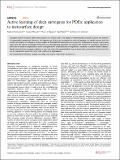Active learning of deep surrogates for PDEs: application to metasurface design
Author(s)
Pestourie, Raphael; Mroueh, Youssef; Nguyen, Thanh V.; Das, Payel; Johnson, Steven G
DownloadPestourie_et_al-2020-npj_Computational_Materials.pdf (1.266Mb)
Publisher with Creative Commons License
Publisher with Creative Commons License
Creative Commons Attribution
Terms of use
Metadata
Show full item recordAbstract
Surrogate models for partial differential equations are widely used in the design of metamaterials to rapidly evaluate the behavior of composable components. However, the training cost of accurate surrogates by machine learning can rapidly increase with the number of variables. For photonic-device models, we find that this training becomes especially challenging as design regions grow larger than the optical wavelength. We present an active-learning algorithm that reduces the number of simulations required by more than an order of magnitude for an NN surrogate model of optical-surface components compared to uniform random samples. Results show that the surrogate evaluation is over two orders of magnitude faster than a direct solve, and we demonstrate how this can be exploited to accelerate large-scale engineering optimization.
Date issued
2020-10Department
Massachusetts Institute of Technology. Department of MathematicsJournal
npj Computational Materials
Publisher
Springer Science and Business Media LLC
Citation
Pestourie, Raphael et al. "Active learning of deep surrogates for PDEs: application to metasurface design." npj Computational Materials 6, 1 (October 2020): 164 © 2020 The Author(s)
Version: Final published version
ISSN
2057-3960